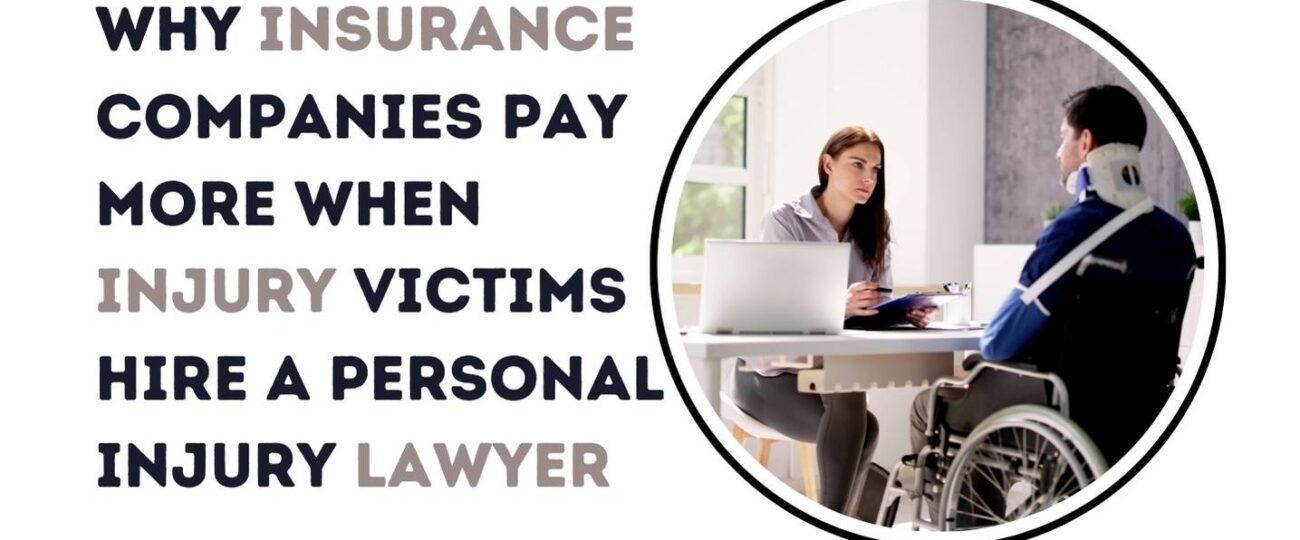When injury victims are involved in car accidents, they often assume the insurance company will cover their damages fairly. However, in reality, insurance companies are businesses, and their primary goal is to protect their bottom line, often offering victims lower settlements than they deserve. This is where the role of a personal injury lawyer becomes crucial. Hiring an experienced attorney usually leads to higher compensation for the victim, but why is this the case? And what does the process look like for someone who chooses to navigate a claim without legal representation?
Why Insurance Companies Pay More When Victims Hire Lawyers
1. Lawyers Understand the True Value of Claims
One of the main reasons insurance companies offer higher settlements when a victim has a personal injury lawyer is because lawyers know how to accurately calculate the value of a claim. Many victims, especially those unfamiliar with personal injury law, underestimate the value of their claims. They may only account for immediate costs like medical bills or car repairs but fail to include future medical expenses, lost wages, and non-economic damages like pain and suffering.
Personal injury lawyers, however, have experience in evaluating the long-term impact of injuries. They know to factor in everything from rehabilitation costs to emotional trauma, ensuring that the victim seeks appropriate compensation for all aspects of their suffering.
2. Lawyers Can Negotiate Effectively
Insurance companies employ highly skilled adjusters trained to minimize payouts. These adjusters often use tactics to make victims feel like they have no choice but to accept a low offer. Without legal training or knowledge of the tactics adjusters use, victims may feel pressured and accept settlements much lower than they deserve.
However, when a lawyer is involved, insurance companies know they are up against someone who understands the nuances of personal injury law and the negotiation process. Lawyers can push back effectively against lowball offers and have the ability to take the case to trial if the insurance company refuses to offer a fair settlement. The threat of litigation alone often motivates insurance companies to offer more generous settlements, as they want to avoid the cost and risk of going to court.
3. Lawyers Gather Strong Evidence
To get the maximum compensation, victims need strong evidence. This includes medical records, police reports, witness testimonies, and even expert opinions. A personal injury lawyer has the resources to gather, organize, and present this evidence effectively. They can also identify what additional documentation may be necessary to strengthen the case, such as obtaining footage from traffic cameras or consulting with medical professionals to provide testimony about the extent of injuries.
Without a lawyer, victims may struggle to gather all of the necessary evidence, which weakens their case and gives the insurance company an opportunity to offer a lower settlement.
4. Lawyers Understand Legal Procedures
Personal injury claims involve a series of legal procedures, deadlines, and requirements that can be overwhelming for someone without a legal background. Missing a filing deadline, failing to submit the proper documents, or misunderstanding the legal standards for proving fault can result in losing the right to compensation.
Insurance companies know that when victims represent themselves, they are more likely to make procedural errors. This can result in lower settlement offers or, in some cases, outright denial of the claim. However, personal injury lawyers are well-versed in the legal process and ensure that everything is handled properly, reducing the chances of errors that could harm the claim.
5. Contingency Fee Arrangements
Most personal injury lawyers work on a contingency fee basis, meaning they only get paid if the victim wins the case or receives a settlement. This arrangement aligns the interests of the lawyer and the client—both want the highest possible settlement. Because of this, lawyers are incentivized to fight aggressively for maximum compensation. The insurance companies are aware of this and may be more inclined to settle quickly and for a larger amount, knowing the lawyer is motivated to see the case through to the best possible outcome.
What the Process Looks Like Without a Lawyer
Many people choose to handle their injury claims without a lawyer, believing it will save them money. However, this can lead to a far more challenging and often frustrating process. Here’s what it typically looks like:
1. Initial Contact with the Insurance Company
After the accident, the victim will file a claim with the at-fault party’s insurance company. Soon after, they will likely be contacted by an insurance adjuster who will ask for a recorded statement, seek information about the injuries, and possibly offer a quick settlement. The adjuster may seem friendly, but their job is to protect the insurance company’s interests, not the victim’s.
Without legal representation, the victim may unknowingly say something that could hurt their case. For example, they might downplay the extent of their injuries or mistakenly admit partial fault for the accident, both of which could reduce their potential settlement.
2. Gathering Evidence
Next, the victim must gather evidence to support their claim. This includes medical records, bills, and proof of lost wages. They will also need to collect photos, police reports, and witness statements, which can be time-consuming and difficult, especially while recovering from an injury.
Without a lawyer’s guidance, it’s easy to miss critical pieces of evidence, or to be unaware of what types of documentation are most persuasive in a personal injury claim.
3. Negotiating with the Insurance Adjuster
The negotiation process is one of the most stressful aspects of handling a personal injury claim without a lawyer. Adjusters will often offer a low initial settlement, hoping the victim will accept it out of a desire to resolve the matter quickly. Victims who lack experience in negotiating with insurance companies may feel pressure to settle, particularly if they are dealing with mounting medical bills and lost wages.
Without knowledge of the legal value of their claim or the ability to effectively counter low offers, victims are at a significant disadvantage. They may accept far less than their case is worth simply because they don’t know how to push for more.
4. Dealing with Medical Bills
One of the most complicated aspects of a personal injury case is managing medical bills and liens. Healthcare providers may demand payment even before the insurance claim is settled, and hospitals or doctors may place liens on the settlement to recover their costs. Navigating this process can be incredibly complex without a lawyer, leading to more stress and potential financial strain.
5. Potential for Lower Settlements
Ultimately, victims who represent themselves are more likely to end up with a lower settlement than they would if they had hired a lawyer. Insurance companies know that self-represented victims are less likely to take the case to court and may be more willing to accept a quick, low settlement just to move on.
Conclusion
While it may seem tempting to handle a personal injury claim without a lawyer to avoid paying attorney fees, the reality is that victims often receive significantly more money when they hire a personal injury lawyer. Lawyers understand the legal process, know how to negotiate effectively, and can gather the necessary evidence to build a strong case. For most victims, hiring a lawyer is not only an investment in their case but a way to ensure they are treated fairly by insurance companies and receive the compensation they deserve.
See Also: Find the Best Auto Accident Lawyers Near Me Today!










